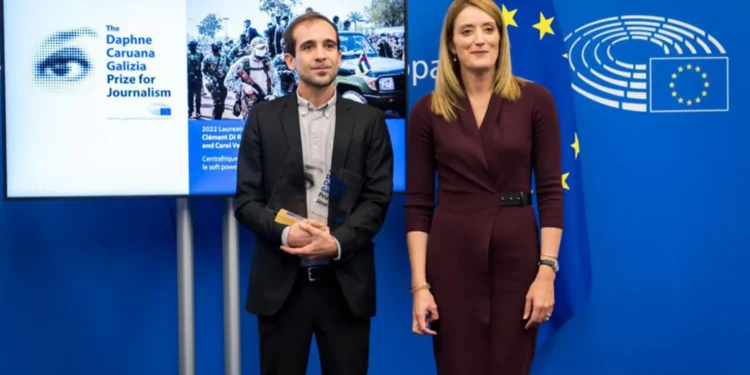Brussels (Brussels Morning) – The European Parliament announces the Daphne Caruana Galizia Prize for Journalism on World Press Freedom Day, honouring investigative reporting that upholds EU values. Entries are welcomed from professional journalists across the EU.
On World Press Freedom Day, the European Parliament officially undertook the call for submissions for admissions to the Daphne Caruana Galizia Prize for Journalism.
What is the Daphne Caruana Galizia Prize for Journalism?
The Prize rewards every year excellent journalism that promotes or supports the core principles and values of the European Union such as human dignity, liberty, democracy, equality, rule of law, and human rights.
European Parliament President Roberta Metsola expressed: “Journalists must be free to do their work. That is non-negotiable. Each year the European Parliament renews its commitment to uphold media and press freedom, in tribute to the fearless journalist Daphne Caruana Galizia. Daphne was assassinated, but her spirit endures in the work of journalists who, just like her, champion truth, pluralism and justice. This prize belongs to them”.
Who is Eligible to Submit Entries for the Prize?
The Prize is available to professional journalists and groups of professional journalists of any nationality, who can propose in-depth pieces that have been published or broadcast by media based in one of the 27 EU nations. The aim is to help and highlight the importance of professional journalism in protecting human dignity, freedom, democracy, equality, the rule of law, and human rights.
How is the Winner of the Prize Determined?
An independent jury comprised of representatives of the press and civil society from the 27 member nations, as well as representatives of the main European Associations of Journalism, will determine the winning entry. The award event takes place each year around 16 October, the date Daphne Caruana Galizia was assassinated.
The prize and the €20 000 prize money reveal the European Parliament’s strong backing for investigative journalism and the significance of a free press. Over the last few years, Parliament has cautioned about attempts both in the EU and beyond to sabotage media pluralism.
What Legislative Actions Has the European Parliament Taken?
MEPs have frequently condemned the attacks on journalists, especially from politicians, across many member states, and urged the Commission to table legislation against abusive lawsuits. The first new regulation to tackle malicious litigation against critical voices was approved in February 2024. In March, the Parliament also gave its green light to the EU Media Freedom Act, a new law to safeguard EU journalists and freedom of the press.
Who Was Daphne Caruana Galizia and Why is the Prize Named After Her?
Daphne Caruana Galizia was a Maltese journalist, blogger and anti-corruption activist who reported broadly on corruption, money laundering, organised crime, the trade of citizenship and the Maltese government’s connections to the Panama Papers. Following harassment and threats, she was killed in a car bomb explosion on 16 October 2017. The uproar over the authorities’ handling of her murder inquiry ultimately provoked the resignation of Prime Minister Joseph Muscat. Critical of failings in the investigation, in December 2019, MEPs called on the European Commission to take measures.




